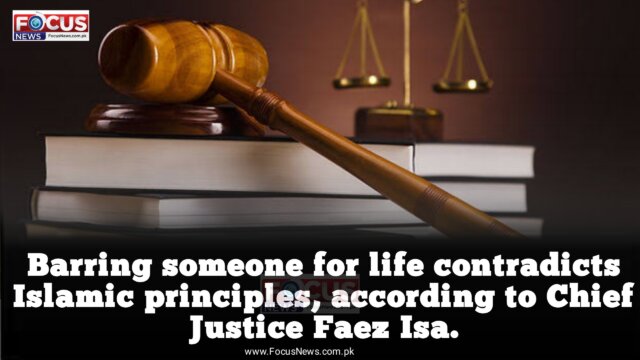Barring someone for life contradicts Islamic principles, according to Chief Justice Faez Isa.

On Thursday, Chief Justice of Pakistan (CJP) Qazi Faez Isa remarked that imposing a lifetime disqualification from parliament goes “against Islam.” The Supreme Court conducted a hearing on a case related to the lifetime disqualification of lawmakers under Article 62(1)(F) of the Constitution. The court had previously noted contradictions in the Election Act, 2017, and an apex court verdict during a hearing on a petition filed by former PML-N provincial lawmaker Sardar Meer Badshah Khan Qaisrani. Qaisrani had challenged his lifetime disqualification over a fake degree in 2007.
“This is a constitutional issue, which we are going to settle once and for all, and we will try to conclude it quickly in order to prevent confusion for the returning officers (ROs) while receiving nomination papers for the upcoming elections,” remarked CJP Isa during the previous hearing. Today, a seven-member bench headed by CJP Isa and comprising Justice Syed Mansoor Ali Shah, Justice Yahya Afridi, Justice Aminuddin Khan, Justice Jamal Khan Mandokhel, Justice Muhammad Ali Mazhar, and Justice Musarrat Hilali presided over the hearing. Attorney General for Pakistan (AGP) Mansoor Usman Awan and lawyers Reema Omar, Azir Bhandari, and Faisal Siddiqui, appointed as amici curiae, also appeared before the court. The proceedings were broadcast live on the SC’s website and YouTube channel.
The top judge mentioned that the court was seeking “clarity” on whether the disqualification period for a lawmaker was five years, as per the amendment in the Election Act 2017, or a lifetime ban under the aforementioned article dealing with the criteria to contest elections. CJP Isa remarked that the solution to this matter is present in Islam. He cited a verse from Surah Sajda in the Holy Quran, explaining that human beings are not inherently bad, but their deeds define them. He added, “Disqualifying anyone [for life] is against Islam.”
The top judge emphasized that Article 62(1)(F) calls human beings bad, but lifetime disqualification closes the door to repentance, which is contrary to the essence of forgiveness in Islam. He questioned how the court could close the door to repentance when God doesn’t. CJP Isa earlier stated that lifetime disqualification under Article 62(1)(F) is determined by one’s perception, not the Constitution. He warned against creating confusion related to elections and expressed concern that filing cases in different courts would obstruct the electoral process scheduled for February 8.
The lawyer representing the petitioners, Khurram Raza, faced scrutiny from the seven-member bench, with CJP Isa expressing concerns about him “siding with dictators.” Raza argued that a constitutional amendment is necessary to end lifelong disqualification, prompting Justice Jamal Khan Mandokhail to question whether Parliament couldn’t legislate. Raza responded that while Parliament legislates, the Supreme Court interprets it. The debate revolved around whether the court should uphold its 2018 ruling in the Samiullah Baloch case, asserting that the disqualification under Article 62(1)(f) was meant to be “permanent.” Faisal Siddiqui argued that the mechanism to define the disqualification period was flawed. The court also considered whether the Samiullah Baloch verdict, which had not been challenged, could be nullified through new petitions.
The verdict of the case holds significant implications for several politicians, including Nawaz Sharif and Jahangir Tareen, determining whether they can contest the upcoming elections. The last hearing on January 2 emphasized avoiding assumptions of favoritism toward a particular party. Chief Justice Isa highlighted the need to settle the issue, questioning the simultaneous existence of the Supreme Court’s judgment on lifetime disqualification and the amendments to the Elections Act 2017. The 2018 Supreme Court judgment held that disqualification under Article 62(1)(f) would be a lifetime ban, but an amendment by the PDM government reduced it to five years retrospectively.
